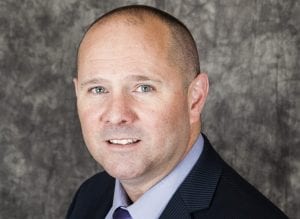Story by Cynthia Van Ginkel
The headlines are scary: social media cyber security privacy breaches, fraudsters who steal from the elderly, international money laundering schemes. As technology continues to infiltrate all areas of our lives – not to mention our financial transactions – opportunities for fraud and financial crime are evolving and growing.

For BCIT grad Steve Wilson, pictured above, this network of risk provides a fascinating and rewarding investigative career.
A BCIT Forensics grad, Steve has returned to BCIT as a leader, helping to launch BCIT’s new Graduate Certificate in Fraud and Financial Crime. He’s brought his international expertise on trends in cybercrime, fraud awareness, and prevention to help develop a program that can be completed part-time in less than a year.
Steve entered the field twelve years ago, and has had a range of roles in law enforcement, the financial services industry, and the private sector. His formal training includes a Bachelor of Technology in Forensic Investigation: Computer Crime Option. He’s also a Certified Fraud Examiner (CFE), Certified Financial Crime Investigator (CFCI), and holds a number of other economic crime and computer crime qualifications. Currently he’s further rounding out his business expertise, and is soon to finish an MBA.
A broad skill set
“It’s a fact that fraud and economic crime is changing and we need to change and keep up with the current trends,” explains Steve. “Basic investigation skills are no longer enough: we need to keep developing, innovating, and improving as well.” From the latest in data analytics to new techniques in digital forensics, Steve says those in the field thrive on constantly watching for new developments.
The ideal skill set for careers in his area include strong teamwork, networking skills, critical thinking, and a good grounding in how technology can aid in investigations. He feels BCIT Forensics prepared him for just this.
“BCIT provided me not only with the skills required for my current leadership role, but also with the ability to become a proactive force in identifying and preventing fraud and economic crime through the use of technology, data, and applying precise business concepts and skills to mitigate risk.”
Fixing and preventing
In his current role managing investigative and forensic services, Steve deals directly with clients who have been impacted by fraud and financial crime. He works with them to address incidents, as well as helping them develop controls and processes to mitigate and prevent future problems.
As President of the Vancouver Chapter of the Association of Certified Fraud Examiners (ACFE), he’s also helping to further connections in the field though networking, shared resources, and events. He urges those considering the field to “never stop learning, inquiring and networking with other professionals.” He’s certainly leading by example there.
For more information on BCIT Forensic programs, visit bcit.ca/forensics or check out these related stories: